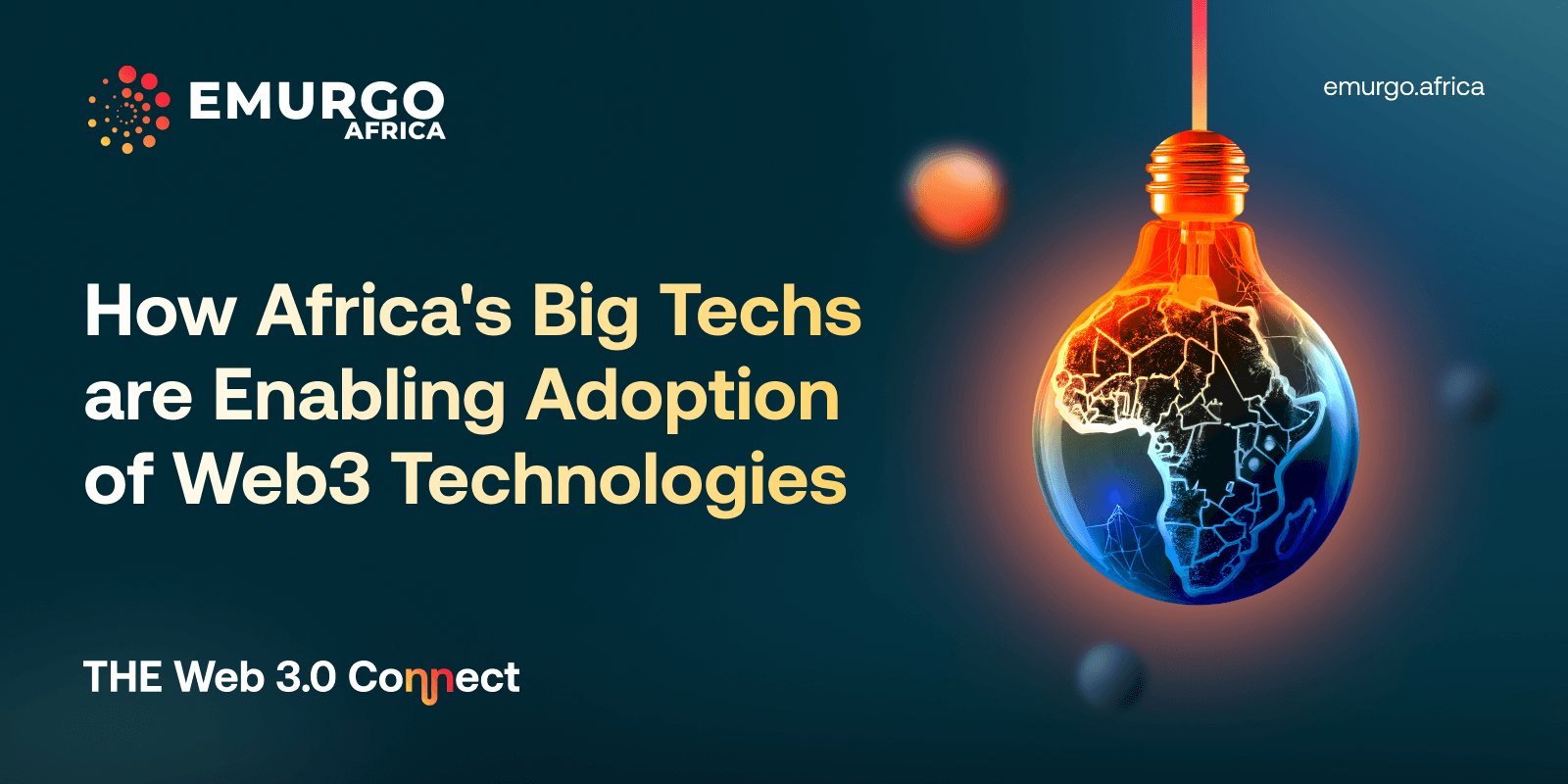By Shogo Ishida and Yosuke Yoshida, Co-CEOs, EMURGO Africa
Big Tech companies in Africa are actively contributing to the widespread adoption of Web3 technologies throughout the continent. Through strategic investments in the expansion of internet infrastructure, they are enhancing the affordability and accessibility of cryptocurrencies and decentralized finance, both of which heavily depend on robust internet connectivity.
More critically, these African Big Tech players are engaged in pivotal technologies that facilitate peer-to-peer transactions, seamlessly incorporating them into mobile money platforms. Collaborations with prominent crypto exchanges and blockchain firms further underscore their commitment to bringing Web3 innovations to life in Africa.
Key Takeaways
- South Africa’s MTN is pioneering Africa’s metaverse dream.
- Safaricom has enabled Kenyans to trade crypto via Binance and Paxful
- Flutterwave leads Nigeria’s quest for more crypto and blockchain usage
MTN Wants Africa to Go Deep Inside the Metaverse
MTN, a leading telecommunications company based in Johannesburg, South Africa, has made significant moves to establish itself in the metaverse, becoming the first African company to do so. The metaverse is a decentralized virtual world providing digital experiences as an alternative to the real world, and involves key civilizational aspects like social interactions via virtual reality, currency (crypto), trade, economy, and property ownership in the form of NFTs (Non-Fungible Tokens).
Present in 21 African countries, it is Africa's largest mobile network operator, with a subscriber base of 290 million as at 2023. It plans to take the metaverse to every market it operates, albeit, virtually.
In February 2022, MTN purchased 144 plots of land in the Africarare metaverse Ubuntuland for an undisclosed sum. Ubuntuland is a virtual world inspired by the African landscape. This marked a symbolic entry point for the continent and signaled MTN’s commitment to exploring the metaverse's potential.
In October 2022, the company announced a new metaverse platform -altMTN. MTN said at the time its metaverse is geared towards helping the company support African innovation by featuring live events and enabling shopping, gaming, and learning.
In November 2022, MTN held the first ever virtual music concert in the metaverse to help unlock the potential of immersive experiences. It ran a competition with its customers, giving them a chance to win exclusive tickets to the concert. Partnering with The Mic: Africa, an African music, arts, and culture networking platform, the event attracted attention and helped raise awareness of the metaverse among African audiences.
In May 2022, social media giant Meta projected that the metaverse will pump an additional $40 billion into sub-Saharan Africa’s gross domestic product (GDP) in a decade’s time.
The metaverse aside, MTN, via its mobile money platform (MTN MoMo), allows its subscribers to trade crypto on the pan-African crypto exchange Paxful.
MTN also allows South African shoppers to pay for goods across 10,000 retail stores in the country using crypto. This is enabled through NFT marketplace Momint.
Safaricom is Making Crypto Trade Seamless for Kenyans
East Africa’s biggest company Safaricom, is a mobile network operator which operates in Kenya and Ethiopia, with over 52 million subscribers in both countries. The company pioneered mobile money technology in the world. Named M-Pesa, it is the most successful commercial mobile money transfer service of its kind anywhere in the world.
Safaricom now uses it to break barriers to entry into the crypto market in Kenya by offering its API (Application Programing Interface) to crypto exchanges.
On the crypto exchange Binance, Kenyan crypto traders can buy and sell Bitcoin and other cryptocurrencies via M-Pesa at a zero transaction fee. This has been ongoing since 2020. If for instance you’re selling your crypto tokens on Binance, they are first converted into USDT. You then select the online M-Pesa merchant with the best rates for you from a list of available buyers. Once the transaction is initiated, you receive your money in Kenya shillings in your M-Pesa account.
On Paxful, Kenyans can also use their M-Pesa accounts to buy and sell crypto. This offers them a wider variety of cryptocurrencies available for purchase and sale. Paxful also allows Kenyans to buy crypto using their Safaricom Bonga points. Bonga Points is a loyalty program offered by Safaricom. Subscribers earn points for using their Safaricom line for voice calls, SMS, and data. These points can be redeemed for bill payments, airtime, SMS and data bundles.
In August 2023, crypto exchange Yellow Card announced that it had received the green light from Kenya’s mobile money providers to use the M-Pesa and Airtel API (Application Programming Interface) to allow Kenyans to make crypto payments in local currency at zero cost. “With the addition of mobile money services, you can do more crypto trading and purchases,” the company said.
Safaricom is actively exploring the potential of blockchain technology beyond just cryptocurrency. It has piloted projects using blockchain for land title management, identity verification, and cross-border payments, demonstrating its interest in the wider applications of this technology. In its 2022 annual report, Safaricom notes: “We anticipate that new modalities such as blockchain and software as a service (SaaS) will become more prevalent in our thinking and innovation.”
Flutterwave is Leading Nigeria’s Push for Blockchain and Crypto Adoption
In 2018, Africa’s biggest unicorn Flutterwave integrated its API with the Ripple Blockchain Network (RippleNet), a global leader in enterprise blockchain, to allow for faster and more efficient cross-border transactions.
While RippleNet isn't a cryptocurrency network itself, as a global payments network, it uses blockchain technology to enable Flutterwave to offer faster and cheaper settlement for international payments made by clients. Payments are still made in traditional fiat currencies, but the settlement process is facilitated by RippleNet's blockchain technology.
However, Flutterwave’s platform allows users to buy crypto using their cards , with the equivalent amount of crypto being sent to their wallets. It runs a digital store where users can buy digital products using bitcoin. On Paxful, Flutterwave also allows users to buy and sell crypto.
In 2021, Flutterwave started allowing users to link their eNaira wallets and make transactions using the Nigerian Central Bank Digital Currency (CBDC) - eNaira. In 2022, Flutterwave added the eNaira as a payment option for merchants, a move aimed at boosting adoption of the digital currency. At the time, Flutterwave said over 1 million merchants accepted eNaira payments from their customers.
Flutterwave has a partnership with IntaSend, a payments API firm, to offer crypto payment options. While not directly facilitated by Flutterwave, it shows the company’s openness to integrating with crypto-enabled services. Flutterwave has shown interest in exploring crypto payments in the future. As regulations evolve and market demand grows,Fluttwerwave is expected to consider venturing into managing its own blockchain projects.
DISCLAIMER: The information in this content (website or other form) does not represent an offer or commitment to provide any product or service. The analysis, opinions and estimates expressed in this content are those of the respective authors, and may differ from those of EMURGO Africa and/or other EMURGO Africa employees and affiliates. Copying, re-publishing or using this material or any of its contents for any other purpose is strictly prohibited without prior written consent from EMURGO Africa.

